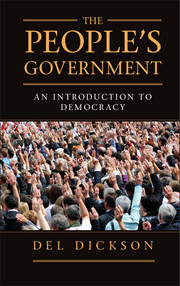Book contents
- Frontmatter
- Contents
- Acknowledgments
- Prologue
- 1 Liberty and Freedom
- 2 Freedom or Liberty?
- 3 Rights
- 4 Participation and Representation
- 5 Inclusion
- 6 Equality
- 7 Power
- 8 The Case against Democracy
- 9 The Case for Democracy
- 10 Building a Stable Democracy
- 11 Three Misconceptions about Democratization
- 12 How Democracies Die
- 13 How Democratic Is the United States?
- Glossary and Biographies
- Bibliography
- Index
- References
2 - Freedom or Liberty?
Published online by Cambridge University Press: 05 August 2014
- Frontmatter
- Contents
- Acknowledgments
- Prologue
- 1 Liberty and Freedom
- 2 Freedom or Liberty?
- 3 Rights
- 4 Participation and Representation
- 5 Inclusion
- 6 Equality
- 7 Power
- 8 The Case against Democracy
- 9 The Case for Democracy
- 10 Building a Stable Democracy
- 11 Three Misconceptions about Democratization
- 12 How Democracies Die
- 13 How Democratic Is the United States?
- Glossary and Biographies
- Bibliography
- Index
- References
Summary
Like beer, ice cream, and people, democracy comes in two basic types but an infinite variety of flavors. Which type one prefers depends on the answer to a deceptively simple question: which right is more important, freedom or liberty? Are people better off being an active part of a community, or making individual decisions on the basis of enlightened self-interest? Free democracy emphasizes freedom and community; liberal democracy stresses liberty and individualism. Free democrats long to belong; liberal democrats mostly just want to be left alone.
FREE DEMOCRACY
Free democracy begins with Aristotle’s view that people are political animals. Our social nature leads us to seek the company of others, and to organize ourselves into communities on the basis of shared political, social, and economic interests. It is the same impulse that leads people to enjoy going to movie theaters, ball games, shopping malls, and using social media. If Aristotle was right, then freedom is not only essential to democracy; it is a central aspect of human nature.
In a free democracy, government is not merely accountable to the people; it is the people. Every eligible citizen is a legislator engaged in, and responsible for, collective decision making. With habitual popular participation in government, the gap between ruler and citizen virtually disappears.
Free democracy is catholic in spirit, centered on community and public life. Free democrats believe that it is only as an integral part of a good and just society that people can realize their individual and collective potential. Whereas some communities take pleasure in being together, a free community takes pleasure in doing things together. Politics in this context is a cooperative enterprise, a team sport where ultimately everyone is on the same team. Accordingly, free democracies sometimes go to great lengths to try to avoid factional infighting and partisanship, in favor of unity and communal harmony (Figure 2.1).
- Type
- Chapter
- Information
- The People's GovernmentAn Introduction to Democracy, pp. 10 - 28Publisher: Cambridge University PressPrint publication year: 2014



